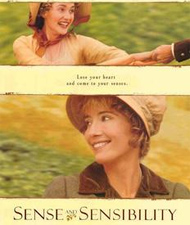 by Chuck Colson –
by Chuck Colson –
The experts have a lot of ideas about why marriages crumble. But one of my favorite answers comes from someone who gave literary marriage advice — some 200 years ago: Jane Austen.
Miss Austen had a delightfully satirical eye — an approach to life that was reflected in her novels. But as Benjamin Wiker points out in his new book, 10 Books Every Conservative Must Read, Austen, the daughter of a clergyman, also had a strong and biblical core of common sense — especially when it came to romantic relationships. Her books reflect the moral order, and celebrate marriage itself.
Wiker notes that Austen lived during the early Romantic movement. The Romantics were lived a life “defined by the passions of the moment. For them, to feel is everything.”
In her novel, Sense and Sensibility, Austen describes the inevitable consequences of this approach to life. It’s the story of two sisters, both of whom fall deeply in love. The elder sister, Elinor, “has learned to govern and guide her passions by reason,” Riker says — and ultimately marries a man of good character.
We must educate ourselves to train our thoughts and feelings to correctly reflect the actual moral order.
By contrast, the younger sister, Marianne, indulges her passions without regard for prudence. Although Elinor warns Marianne against giving her heart to an attentive young man she barely knows, for Marianne, Wiker notes, “passion is the thing. Feelings must take the place of judgment.” And “being a creature of sensibility, Marianne has no sense,” no interest in learning good moral judgment, which involves “training feelings by habit and reason.”
Marianne had yet to learn what C.S. Lewis taught: that the question is not what feelings we happen to have, but what feelings we should have. Therefore, Wiker says, “We must educate ourselves to train our thoughts and feelings to correctly reflect the actual moral order.” Marianne saw no need to do this — which is why, in time, her heart was broken by the worthless young man she’d so quickly — and imprudently — fallen in love with.
Unfortunately, our culture has taken Marianne’s attitude to its logical — and tragic — conclusion, Wiker notes. Like the Romantics, modern liberalism celebrates “the victory of sensibility over sense, the passions over reason, self-absorption over moral duty, romantic anarchy over tradition.”
modern liberalism celebrates “the victory of sensibility over sense, the passions over reason, self-absorption over moral duty, romantic anarchy over tradition.”
Jane Austen would have been “rightly horrified at our not heeding her warning, but unsurprised by the results” — including, sadly, the high divorce rate, and the seduction of so many unthinking young women by men of bad character.
How much happier we would be if both men and women took the time to learn good moral judgment, and retrain their more impulsive feelings to reflect the moral order. Instead of rushing headlong into marriage, they should go slowly, inviting the advice of wise parents, friends, and church counselors.
Were Jane Austen alive today, she’d make a wonderful speaker for our Centurions program. While it may be “a truth universally acknowledged that a single man in possession of a good fortune must be in want of a wife,” as Austen satirically put it, she would make sure her readers learned a more serious point: That the route to marital happiness is recognizing that there is a moral order, and that we ignore it at our peril.
HT: Break Point



